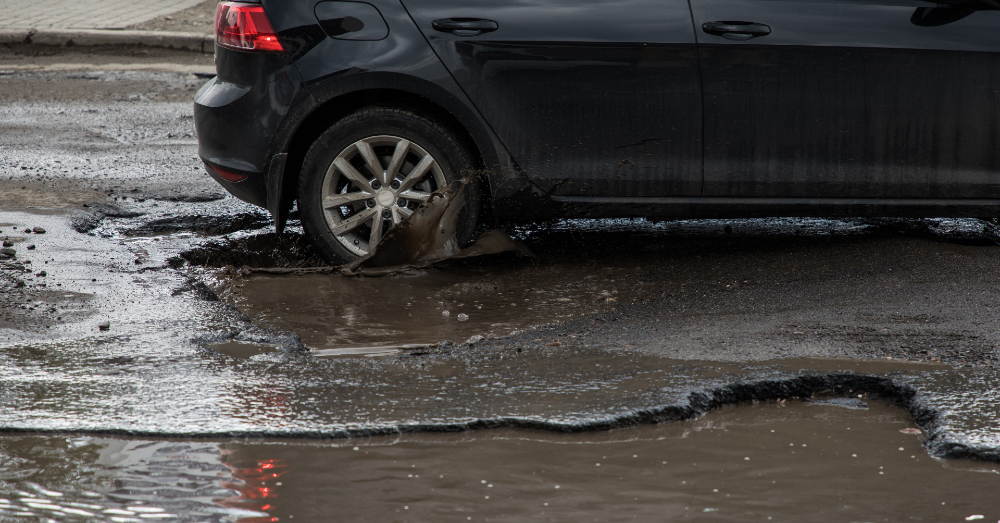If you’ve ever wondered why road crews are always working, one reason is potholes. Potholes cause vehicle damage that can be problematic.
The end of winter doesn’t signal the end of troublesome driving on the roads. In fact, many roads will develop potholes as the season ends. These holes are spots in the road where the asphalt separates or sinks to create a dangerous spot for your tires. Although these road hazards are not your responsibility, if you hit them with your car, you can experience much more damage than you’d ever want to deal with.
How are potholes formed?
Potholes would never form if the materials below the roads were made of solid rock going to the core of the planet. Unfortunately, that’s not the case. These road imperfections occur when the soil beneath the pavement becomes weakened or displaced. As the ice from winter melts, the running water can alter the base layers under the pavement, causing weak spots, which then become potholes. These holes usually start out small, but the more traffic drives over them, the larger they become.
Winter areas aren’t the only regions susceptible to potholes
If you live in a warmer climate and wonder why the roads are so terrible and riddled with potholes, there are reasons. Potholes aren’t only a winter-weather phenomenon; these holes can form in warmer climates as well. The displacement of the surfaces and materials under the roadways doesn’t only take place when the weather warms, and the ice melts. Potholes cause massive vehicle damage every year, which is problematic for many drivers. In fact, these roadway issues account for nearly $3 billion in vehicle damage, which means big business for auto repair shops and unexpected expenses for drivers.
The most commonly damaged car part is your tires
It only makes perfect sense that a pothole could be the cause of your tires becoming damaged. These are the most commonly damaged part of your vehicle. The impact of your tire with a pothole can cause your tire to lose air. If you’ve got a vehicle with a Tire Pressure Monitoring System, the light will go on and tell you which tire has an issue. The jarring impact of a pothole on your tire can create a bulge in the sides of the tire or a weak spot with internal damage.
Has your car begun to pull to one side or the other?
One of the most common ways potholes cause vehicle damage is by changing the alignment of your steering and suspension system. Sometimes, after hitting a pothole, you’ll feel the car doesn’t stay in the center of the lane like it did previously. This means the pothole could have bent one or more suspension or steering components to put them out of alignment. This can become a serious handling problem, and your tires will wear unevenly. Unfortunately, some damage to the suspension or steering can be expensive.
Your wheels might get damaged by potholes
You might think that your tires are a buffer to keep your wheels from being damaged when you hit a pothole, but that’s simply not the case. When potholes are big and deep, the impact can be strong enough to damage and bend the wheels, which requires them to be replaced after hitting the pothole. A bent wheel won’t roll smoothly and won’t form an airtight seal with the tire, which causes even more problems. Even subtle hairline cracks along the wheel can create problems for you. If you bend a wheel in a pothole, you’re in for an expensive repair.
Have you damaged your control arms?
Hitting potholes can cause vehicle damage that’s not immediately evident. Your wheels and tires might look fine, the suspension could work right, and the steering might only feel a little off-center. It seems as though all you need is an alignment to fix the problem, but that’s not always the case. The damage done to your car might show up in the control arms, not anywhere else. Left unrepaired, control arm damage causes your tires to wear unevenly, and your steering will remain a little off-center until repairs are done.
Did you damage your exhaust system?
The exhaust pipes of your vehicle run along the underside of the car, which means these pipes are in the perfect spot for potholes to damage them. If you experience power loss or strange noises, the exhaust system might have become damaged when you hit a pothole. The worst part of this is you can damage this part without going fast. The pothole would have to be deep, but sometimes you can’t avoid them. When you bottom out and scrape the undercarriage against the pavement, your exhaust system could be damaged in the process.
How can you avoid damage from potholes?
Potholes cause vehicle damage that is problematic and expensive. Although your car insurance will cover the damage if you have comprehensive insurance, it’s still a troublesome problem to deal with. You want to avoid potholes when driving. Here are some tips to help you:
- Check Your Tires – Make sure your tires have the proper tread depth and pressure. Not only will proper tires help you handle potholes, but it’s also a good idea to make driving safer and more efficient when you’re out driving.
- Watch the Road – Continually scan the road ahead for potential potholes. Watch other cars and how they drive as well. If you see standing water, it could be a pothole, and it’s best to avoid hitting that area if you can.
- Slow Down – If you cannot avoid hitting a pothole, slow down and go over it slowly. This will increase the chance your car can come away unscathed. Hitting potholes at high speeds can cause severe damage to your vehicle. You might still come away with some damage, but it will be less if you drive slowly over the pothole.
Potholes cause serious vehicle damage every year. You don’t have to be one of the victims of these road hazards. Be aware that spring is also pothole season, and you need to avoid these troublesome road abrasions as much as you can.
This post may contain affiliate links. Meaning a commission is given should you decide to make a purchase through these links, at no cost to you. All products shown are researched and tested to give an accurate review for you.




